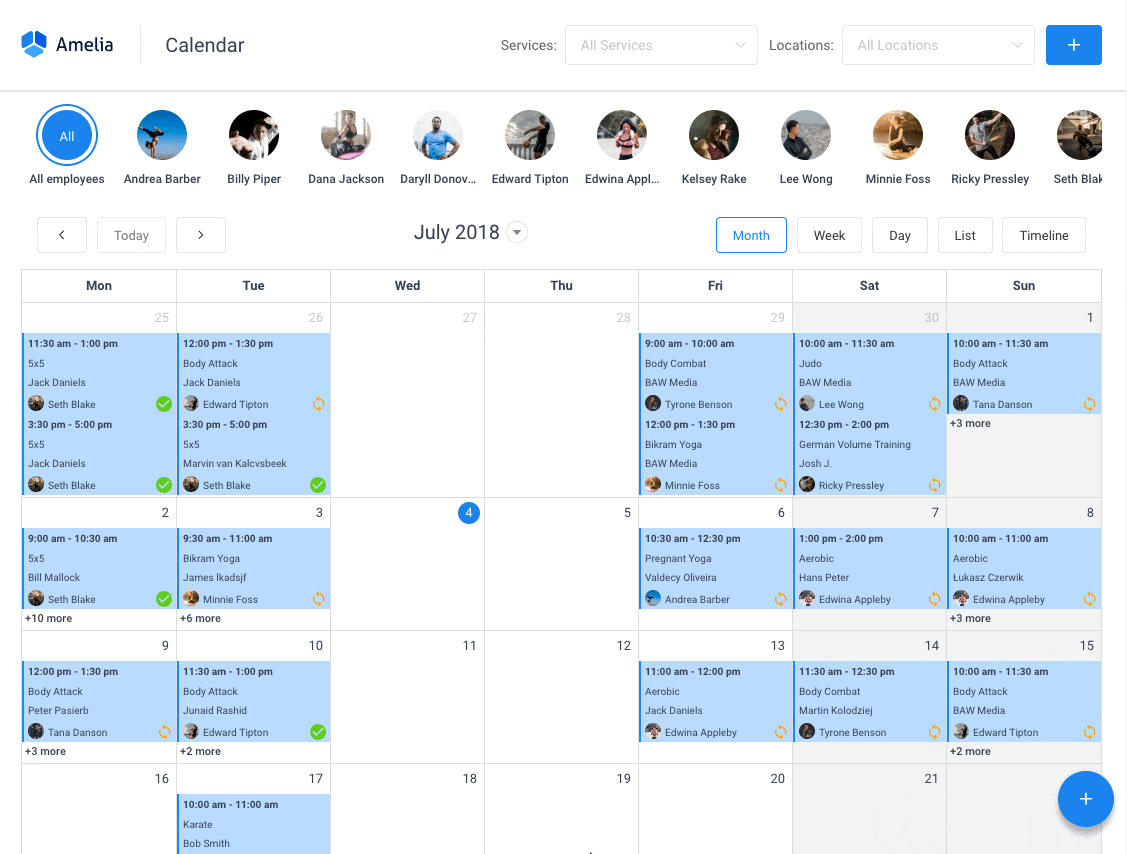The event planning industry is growing. Whether you’re organizing a business event, team building, virtual event, or product launch, having a clear plan is important for success.
Planning an event is exciting and challenging at the same time, as it requires careful attention to detail and consideration of different factors.
In this event planning guide, we’ll give you step-by-step instructions on how to plan an event successfully.
Why Is Event Planning Important?
Event planning is not a one-size-fits-all task. The type of event you’re organizing will significantly influence your approach. As a project manager and event organizer you must develop a customized plan tailored to the specific needs and goals of the event because each event requires a unique strategy to ensure its success.
Before diving into the nitty-gritty details of the event planning process, take the time to define the purpose and goals of your event. Is it a product launch aimed at showcasing a new offering to potential clients, an interactive virtual event, or perhaps a corporate retreat to foster team building? Understanding the type of event you’re organizing is crucial as it sets the foundation for the entire planning process.
More often than not, effective event planning involves collaboration with project managers who specialize in managing large events. These professionals bring a wealth of experience and expertise to the table, helping to plan and execute events seamlessly. Their involvement ensures that every detail is considered, from the initial stages of conceptualization to the post-event evaluation.
Let’s learn the exact steps successful event planners take to organize an effective and prosperous event.
How to Plan an Event: 12-Step Event Planning Guide

Now that you have a clear understanding of the type of event you’re organizing and the importance of involving project managers, let’s explore the step-by-step event planning process. Following these event planning steps will not only help you stay organized but also contribute to the overall success of your event.
-
- Set clear event goals and objectives
- Create an event planning checklist
- Set an event budget and stick to it
- Find the right event venue
- Select the perfect date
- Build your dream team
- Develop your unique event branding
- Select the best event planning and management platform
- Confirm the speakers and VIP lineup
- Forge strategic alliances with partners and sponsors
- Plan entertainment and activities for a memorable experience
- Promote your event
1. Set clear event goals
Setting clear event goals and objectives is a foundational step in planning a successful event. Think of your goals as the guiding star that keeps your entire planning process on track. Without well-defined objectives, it’s easy to lose direction or get caught up in details that don’t contribute to the event’s success.
Start by asking yourself a few key questions:
Why are you hosting this event?
What do you hope to achieve?
Who is your target audience?
The answers to these questions will help you identify your primary goals. For instance, are you aiming to increase brand awareness, generate leads, educate your audience, or foster community engagement?
Once you’ve identified your goals, it’s important to make them SMART—Specific, Measurable, Achievable, Relevant, and Time-bound. For example, instead of setting a vague goal like “make the event successful,” you could aim for “increasing ticket sales by 20% compared to last year within the next six months.” This specificity not only provides clear direction but also gives you concrete metrics to measure your progress and success.
Clear goals also help you communicate effectively with your team and stakeholders. They ensure everyone is on the same page and working towards a common objective. Plus, they allow you to track key performance indicators (KPIs), such as audience engagement, social media buzz, or revenue generated, making it easier to assess your event’s success after it concludes
2. Create an event planning checklist
As you navigate the process of event planning, having a comprehensive event planning list is your guiding compass. This step-by-step event planning tool ensures that no detail is overlooked, helping you stay organized and on track.
Don’t forget to incorporate marketing and promotional tasks into your event planning checklist. This includes creating a timeline for promotional activities, scheduling social media posts, and monitoring the effectiveness of your marketing strategies. A well-executed marketing plan increases visibility and attendance. Plus, you’ll put your event planning business on the map by organizing successful and meticulously planned events.
Don’t underestimate the power of an event planning checklist: It helps you break down the planning process into manageable tasks, ensuring that no detail is overlooked. From securing a venue to promoting the event, an event planning list keeps you on track and minimizes the risk of overlooking crucial elements.
Expert tips on creating an event planning checklist
Aurelija Gintaliene, co-founder and COO at Breezit shared what’s their event planning checklist at Breezit:
“I am an experienced manager as well and I have to tell you that planning an event is really not much different to planning a project. The initial phase of event planning is conceptualization, where we define the event’s purpose, target audience, and desired outcomes.
This serves as the foundation for all subsequent planning basically.
Then we dive into logistics, so venue selection, budgeting, scheduling, and vendor coordination.
You know what’s fun? We’ve created a system and a database for finding that. Now we are actually merging it with AI. It’s a new idea we invested $2 million into last year. Anyways, this part is quite easy when you use Breezit.
All these elements should go well with the event’s objectives. As an event planning firm, it is our job to give good advice in this territory.
We pay special attention to the attendee experience, ensuring that every touchpoint, from registration to on-site interactions, is seamless and engaging.
Marketing the event is another vital step, involving strategies like social media campaigns, email marketing, and partnerships. This phase is all about creating buzz and ensuring maximum attendance.
During the event, our focus shifts to execution and management, ensuring everything runs as planned. We have a team dedicated to handling any unforeseen issues, maintaining a smooth flow of the event.
Post-event, we conduct debriefing sessions to analyze the event’s success against our initial objectives. Gathering feedback from attendees and stakeholders is a crucial part of this process. We also focus on post-event engagement, maintaining the momentum through follow-ups and sharing key takeaways or content from the event.
Overall, successful event planning at Breezit is all about strategic planning, attention to detail, and a relentless focus on delivering a memorable experience to the attendees. I would hope that by now we manage to achieve an almost perfect balance of creativity, logistical precision, and effective communication.”
3. Set an event budget and stick to it
Creating a budget is important for managing finances in event planning. This involves thinking about all the costs related to the event, such as venue rental, food, advertising, entertainment, and logistics. It is also important to stick to the budget during the planning phase.
This means making financial decisions carefully and only spending money that fits within the budget. Following the budget helps prevent financial problems or unexpected issues during the event.
To ensure financial transparency and responsibility, it is important to regularly review and update the budget. This ongoing evaluation helps you as an event organizer to track expenses, identify areas that need adjustments, and ensure that money is allocated effectively. Keeping the budget up to date enables informed decision-making and helps avoid overspending.
By keeping the budget current, you can make knowledgeable choices, prevent excessive spending, make money hosting events, and preserve financial security.
4. Find the right event venue

Image by upklyak on Freepik
The venue sets the tone for the entire event experience. Naturally, venue selection is one of the most important event planning steps. You have to consider factors such as location, capacity, amenities, and ambiance when making your choice.
Large events, in particular, demand careful evaluation of space requirements and logistical considerations to ensure a smooth flow.
Types of event venues
Event venues come in various shapes and sizes, each catering to different needs. From conference centers and hotels to outdoor spaces and unique venues, understanding the nature of your event will guide you toward the most suitable choice. Make sure the venue aligns with your event’s theme and enhances the overall experience for your attendees.
Stay organized with a detailed floor plan
As part of your step-by-step event planning process, create a detailed floor plan for the chosen venue. Consider the placement of key elements such as the stage, seating arrangements, and booths. This not only helps in visualizing the event flow but also ensures that the venue is optimized for both functionality and aesthetics.
5. Select the perfect date
Choosing an appropriate date is a critical decision impacting the success of your event. Consider factors such as:
- Participant availability,
- potential conflicts with other events,
- and seasonal considerations.
Opt for a date that maximizes attendance and aligns with your event’s goals.
6. Build your dream team
The next step is to assemble a top-notch team by identifying individuals with diverse skills and assigning specific roles based on their expertise. Establish clear communication channels and define each team member’s responsibilities to ensure a cohesive and collaborative effort.
Why is it important to match team members with roles that align with their strengths and skills?
For example, someone with a background in marketing might excel at promoting the event, while someone with logistics experience could handle on-site coordination.
7. Develop your unique event branding
Creating a distinct and memorable brand for your event is essential to making a lasting impression on your attendees. Your event branding is more than just a logo or a color scheme—it’s about crafting an experience that resonates with your audience and reflects the essence of your event.
Start with a strong visual identity
Your event’s visual identity, including its logo, colors, and typography, should reflect the core theme and objectives of your event. For example, if your event is about cutting-edge technology, a modern and sleek design might be more appropriate. Consistency is key—ensure that your branding is applied uniformly across all materials, from invitations and signage to your event website and social media profiles.
Expert tips on how to plan an event for SaaS businesses
Rex Huxford, Director of Demand Generation @ MD Clarity also had some insights to share about event planning for SaaS business:
“In the SaaS world, event planning starts with a clear goal, often centered around product promotion or customer education. My approach involves a deep dive into understanding our target audience, tailoring the event’s theme and content to their needs and interests. This includes deciding whether the event will be in-person, virtual, or hybrid, considering current trends and audience preferences. Budget allocation is also crucial, balancing between high-impact elements and cost-effectiveness.
2. Prior to the event, meticulous planning is key. This includes securing speakers or presenters who are thought leaders in the SaaS space, arranging engaging and interactive sessions, and leveraging digital marketing channels for promotion. We use various tools for registrations, such as event management software, ensuring a smooth attendee experience. Collaborating with different teams within our company is essential to align on messaging and objectives.
3. Post-event, the focus shifts to measuring success and engagement. We analyze various metrics, from attendee numbers to session engagement rates, to gauge the event’s effectiveness. Feedback collection through surveys is an integral part of this process. The insights gained are used to refine future event strategies and to nurture leads through targeted follow-up campaigns.”
Tell a story through imagery
Images play a crucial role in conveying the story and atmosphere of your event. Choose images that align with the theme of your event and evoke the right emotions. For instance, a wellness retreat might use serene landscapes and calming colors, while a high-energy tech conference might feature vibrant, dynamic visuals.
Leverage social media
Social media is a powerful tool for extending your event’s brand beyond the physical space. Create event-specific hashtags to encourage user-generated content and make your event more recognizable online. Engage your audience with interactive content, like polls or countdown posts, and collaborate with influencers to broaden your reach.
Create a branded registration experience
The registration process is often the first interaction your attendees have with your event, so it’s important to make it memorable. Use this opportunity to reinforce your branding with a well-designed registration page that includes your logo, color scheme, and consistent messaging. Personalized elements, like custom welcome messages or branded confirmation emails, can further enhance the experience.
Repurpose content for continued engagement
Your event branding doesn’t end when the event is over. Repurpose content from the event, such as photos, videos, and attendee testimonials, to keep your audience engaged and promote future events. This not only extends the life of your content but also strengthens your event’s brand by consistently reminding attendees of the positive experience they had.
8. Select your event planning and management platform
Choosing the right event management platform is one of the most important event planning steps for ensuring smooth and efficient coordination.
You should evaluate various platforms based on their features, usability, and compatibility with your event’s unique requirements. A robust event management solution streamlines tasks such as guest registration, ticketing, and communication, providing a centralized hub for organizing and overseeing all aspects of your event.
Considerations for choosing an event management platform
- Opt for a platform with an intuitive and user-friendly interface, facilitating seamless navigation for both organizers and attendees.
- Ensure that the platform allows for customization to align with your event’s branding and specific needs, offering a tailored experience for participants.
- Look for features that simplify the registration process and ticketing management. This includes options for different ticket types, discount codes, and secure payment processing.
- Effective communication is vital. Choose a platform that offers built-in communication tools to send updates, reminders, and important information to attendees, volunteers, and team members.
- Prioritize event platforms that prioritize data security and privacy. Ensure that attendee information is protected, and the platform complies with relevant regulations.
- Consider whether the platform integrates seamlessly with other tools and applications, such as marketing software, CRM systems, or analytics platforms, to enhance overall efficiency.
- Choose a platform that can scale to accommodate the size and complexity of your event, whether it’s a small gathering or a large-scale conference.
- Access to comprehensive reporting and analytics tools is essential for evaluating the success of your event. Look for platforms that provide insights into attendee engagement, ticket sales, and other relevant metrics.
Expert tips on using event software
And who is better fit to tell us about the importance of using technology when planning an event than Phil Strazzulla, Founder @ SelectSoftware Reviews:
“Our core competency lies in comprehensively understanding software solutions, a skill set that naturally extends to planning and executing successful events. As someone who regularly coordinates software product launches and webinars, I’ve honed my skills in event management, ensuring each event is as informative as it is engaging, with a strong focus on technology integration.
Effective event planning begins with a clear vision and detailed strategy. This involves identifying the target audience, determining the event’s purpose, and outlining the key messages. Before the event, attention is given to logistical planning, marketing, and technology setup, ensuring everything runs smoothly. Post-event, the focus shifts to analyzing attendee feedback and engagement metrics to assess the event’s success and areas for future improvement. Consistent follow-up and content sharing with attendees help in maintaining engagement and building a lasting relationship.”
Amelia – The Event Management Plugin That Has It All
Meet Amelia, the WordPress Event Calendar and Event Management Plugin that’s transforming how over 30,000 event businesses organize and execute their events.
Why Choose Amelia?
Versatility at its Best: From virtual events and conferences to meetups, concerts, and beyond, Amelia caters to all event types. Join the ranks of satisfied users who trust Amelia for their events calendar needs.
Endorsements from Industry Leaders: Featured on prominent platforms like Sitepoint, 1st Web Designer, Smashing Magazine, HubSpot, and Speckyboy, Amelia stands out as a top-tier WordPress events plugin.
High Ratings and Rave Reviews: With a stellar 4.9/5 rating, Amelia has earned acclaim for its user-friendly interface and simplicity in the booking process.
Features Event Planners Love:
Recurring Event Options: Set up recurring events effortlessly, whether daily, weekly, monthly, or yearly. Customize your event calendar with various repeating options for unparalleled flexibility.
Booking Forms Made Easy: Use our plugin to create booking pages swiftly. Embed shortcodes or utilize popular page builders like Divi, Elementor, or Gutenberg blocks. Your event booking page will be up and running in no time.
Flexible Payment Options: Allow attendees to pay a deposit upfront, making it easy for both hosts and participants. Perfect for on-site events where full payments aren’t necessary in advance.
Multilingual Capabilities: Host events in different languages effortlessly. Amelia offers translation options for events, ensuring a seamless booking experience for your international audience.
Dynamic Ticketing: Set different ticket prices based on attendee profiles or purchase dates. Create events, sell tickets, set early bird prices – all managed directly from your WordPress website.
Efficient Filtering and Sorting: Create event tags with distinctive colors for straightforward navigation. Filter and sort events effortlessly, enhancing both backend and front-end user experiences.
Calendar Synchronization: Ensure seamless integration with Google Calendar and Outlook. Hosts can sync their calendars for better event management, and attendees can add events to their calendars with ease.
Ready to take control of your event planning? Explore Amelia’s Demos and Features.
Don’t miss out – grab Amelia now and make your events truly unforgettable!
9. Confirm the speakers and VIP lineup
Securing the right speakers and VIP guests is crucial for the success of your event.
Here’s what you should do:
1. Identify and research potential speakers
Begin by identifying potential speakers who align with your event’s theme and objectives. Look for industry leaders, influencers, and experts who can provide value to your audience. Research their previous speaking engagements to ensure they resonate with your audience. Explore platforms like TED Talks, professional networks, and even social media to find speakers who fit your event’s goals.
2. Craft a compelling invitation
Once you’ve identified your ideal speakers, craft a personalized invitation. Highlight why you believe they would be a great fit for your event and how their participation would benefit both them and the attendees. Make sure to include all relevant details, such as the event date, location, and audience profile. If your budget allows, outline the fee you’re willing to offer or propose other forms of compensation, such as publicity or networking opportunities.
3. Offer clear incentives
Speakers are more likely to accept your invitation if they see clear benefits. Beyond monetary compensation, consider offering perks like travel arrangements, accommodation, and exposure through your event’s marketing channels. Some speakers may be motivated by the opportunity to be part of something bigger, such as a cause or industry movement.
4. Confirm and communicate details early
Once a speaker agrees to participate, confirm their involvement as soon as possible by getting a signed contract. This contract should outline expectations, compensation, and logistical details. Follow up with an information pack that includes everything they need to know about the event, from the itinerary to technical requirements.
5. Manage logistics with care
Take care of all logistical details, including travel and accommodation. Ensure that speakers have a smooth experience by arranging transportation and providing a clear itinerary. This not only helps them focus on their presentation but also leaves a positive impression, potentially leading to long-term relationships.
6. Promote your speakers
Finally, work with your speakers to promote their involvement in the event. Collaborate on how they want to be featured in your marketing materials and ensure they receive the recognition they deserve. This promotion can amplify their reach and increase audience engagement at your event.
10. Forge strategic alliances with partners and sponsors
Building connections with partners and sponsors who align with your event’s goals is one of the most important event management skills. Develop mutually beneficial partnerships that enhance the event experience for attendees while providing exposure and value to sponsors. Clearly define the terms of the partnership, including promotional opportunities and any financial arrangements.
By approaching each unique step with precision, event planners can lay a solid foundation for a successful and well-executed event. Each distinctive title highlights the importance of these key elements in the event planning process.
Learn: How to get sponsors for events
11. Plan entertainment and activities for a memorable experience
Entertainment and engaging activities are key components that contribute to the success of any event. Depending on the event, you can choose from live performances, guest speakers, workshops, and team-building exercises.
When selecting entertainment, think about the nature of your event and what your audience would like. You have various options for entertainment depending on the event.
For a business event, a motivational speaker or industry expert would be suitable. On the other hand, a social celebration could feature live music or a DJ. By tailoring the entertainment to your event, you can make it more meaningful and enjoyable for everyone.
To keep people engaged, incorporate activities that encourage participation, such as Q&A sessions, panel discussions, or networking opportunities.
For team-building events, select activities that promote collaboration and create memorable moments.
Expert tips on how to plan an event to remember
Let’s see how Lisa Richards, CEO and Creator of the Candida Diet gets high engagement from their virtual events:
“Our events flourish because they reflect our deep insight into what our audience craves and how effortlessly we weave our products into their daily lives. Among my most prized discoveries is this: engagement is paramount. In our latest webinar series—attended by over 500 participants—we introduced interactive Q&A sessions; this innovation boosted audience retention by 25% compared to past events and led to a subsequent 15% surge in post-event sales of our anti-candida starter kits, underscoring the power of real-time engagement.”
Catering considerations for culinary delights
Food is important for events, so it’s important to choose the right catering service. They should be able to handle the size of your event and have a menu that suits your audience. Talk to them about any dietary restrictions or preferences to make sure there are options for everyone. Planning the catering well will make the event better and leave a good impression on the attendees.
12. Promote your event

Image by Freepik
Marketing deserves the spot at the top of the steps you need to take to plan events successfully. Why? No matter how well you plan your event, its success hinges on effective promotion.
Marketing and promoting your event should be an ongoing process that starts well before the event date. You should utilize various channels to reach your target audience and build anticipation.
Utilizing social media and other promotional channels
Harness the power of social media platforms to create buzz around your event. Create engaging content, utilize event hashtags, and leverage influencers or industry leaders to promote your event. Additionally, explore traditional promotional channels such as email newsletters, press releases, and partnerships with relevant organizations.
Develop eye-catching event materials
Design visually appealing event materials, including flyers, banners, and digital assets. Consistent branding across all promotional materials helps create a cohesive and professional image for your event. Make sure to include key details such as date, venue, and registration information to encourage attendance.
To ensure a successful turnout, it’s essential to market and promote your event effectively, but don’t forget to tailor your promotional efforts based on the event type and your potential attendees’ interests.
Create effective email marketing campaigns
Build a strong email marketing campaign to keep your audience informed and excited about the event. Segment your email list to send personalized messages that resonate with different segments of your audience. Send out a sequence of emails leading up to the event, including reminders, exclusive offers, and insider content like interviews with speakers.
Use paid advertising
Don’t overlook the power of paid advertising. Run targeted ads on social media and search engines to reach a broader audience. You can start with a small budget and focus on platforms where your audience is most active. Use retargeting ads to remind people who have visited your landing page but haven’t registered yet.
Create a community
Foster a sense of community around your event by creating social media groups or forums where attendees can connect before the event. Share exclusive content and offer special discounts to group members. This not only builds excitement but also turns attendees into promoters who help spread the word.
Event Planning 101: On-site Coordination and Execution
On the day of the event, meticulous on-site coordination is extremely important. Project managers and event organizers must work closely with vendors, staff, and volunteers to ensure that every aspect of the plan is executed flawlessly.
Large events, in particular, may require a dedicated on-site team to manage the complexities that come with a higher number of attendees.
Handling unexpected issues
No matter how well you plan, unexpected issues often arise. Having contingency plans in place for potential challenges is essential. Whether it’s technical glitches, changes in weather for outdoor events, or unforeseen logistical issues, a well-prepared team can swiftly address problems, minimizing the impact on the overall event experience.
Risk management for smooth event execution
Effective risk management involves identifying potential issues and developing contingency plans to address them swiftly. From unforeseen weather changes for outdoor events to technical glitches, a proactive approach minimizes disruptions.
Conduct a thorough risk assessment by considering various factors such as weather conditions, technical requirements, and potential logistical challenges. Anticipating possible issues allows you to develop contingency plans that can be activated if needed.
Prepare for the unexpected by creating contingency plans for identified risks. This might involve having backup equipment, alternative event spaces in case of venue issues, or protocols for addressing health and safety concerns. A well-prepared team is more equipped to handle challenges on the day of the event.
Event Planning 101: Post-Event Evaluation and Continuous Improvement
Once the event has concluded, the journey doesn’t end.
Evaluating events after they happen is important to see what went well and what can be improved. Get feedback from attendees, analyze how the event went, and see if it met your goals.
Every event teaches us something.
Write down what you learned so you can use it for future planning and make your events even better. Ask attendees to share their thoughts and experiences through surveys, social media, or talking directly to you. Honest feedback helps you see what worked and what needs improvement.
Use this feedback to make your future events even better.
We asked Lisa Richards, CEO and Creator of the Candida Diet how they handle post-event evaluation and what results you can expect, let’s see what she had to say:
“Equally crucial for long-term success is post-event management: after each event, we analyze participation data, feedback scores and conversion rates; following our last virtual summit, for instance—40% of attendees were found more likely to purchase products immediately thereafter. Gleaning this insight, we optimized our post-event email sequences—providing time-sensitive discounts on top-selling supplements and recipe books—which elevated our conversion rates by an extra 10%; furthermore, we ensure a follow-up with personalized thank-you messages—a practice that has both nurtured community bonds and spurred a 30% rise in repeat business.”
Event Planning 101: Key Takeaways
Congratulations on reaching the end of our event planning guide! We’ve explored every step of the successful event planning process in-depth, from understanding the importance of event planning to executing a flawless event experience.
Let’s recap some key takeaways and provide you with practical tips on how to plan an event like a pro:
- Tailor your approach
- Involve project managers
- Create a comprehensive event planning checklist
- Choose the right venue
- Plan engaging entertainment and activities
- Use effective marketing strategies
- Streamline the registration process
- Stay updated
- Build a network
- Be adaptable
- Embrace technology
- Be proactive when it comes to risk management
- Reflect and iterate
- Be proactive when it comes to risk management
That’s not all! Want to learn more? We’ve got more tips for event planning:
- How to Get Sponsors for An Event? The Ultimate Guide
- Virtual Event Best Practices in 2024 for Succesful Execution
- The Best Event Ticketing Apps and Tools That You Should Consider
- How to Start an Event Planning Business? The Complete Guide
- Writing Event Planning Business Plan: Step-by-Step Guide


